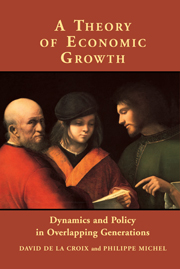Introduction
Published online by Cambridge University Press: 29 October 2009
Summary
Inter-generational transfers are today at the center of the economic policy debate. The reduction of public debt, the financing of social security (pensions), the taxation of capital and bequests, and the design of the education system all imply substantial inter-generational transfers.
The tool economists provide to analyze these issues is the overlapping generations model. As it models explicitly the different periods of life–schooling, working, or retirement periods – it is the natural framework to study the allocation of resources across the different generations.
When it includes capital accumulation, this model also allows one to formalize the development of an economy, relating its growth path to the savings behavior of young agents.
The aim of this book is to provide the reader with an in-depth introduction to this model, including its major policy aspects.
OVERLAPPING GENERATIONS AND MACRO-ECONOMICS
Modern macro-economics is generally characterized by four elements: (a) The issues of concern are aggregate in nature. (b) The models in use are derived from optimizing behavior, and, as a consequence, their properties depend essentially on preferences and technologies. (c) Interactions over time are explicitly taken into account, giving therefore an important place to dynamic analysis. (d) The general equilibrium framework is preferred to partial equilibrium setups.
The building blocks of modern macro-economics are taken from two different approaches: The first one considers that agents have an infinite horizon. The second one analyzes the case of an economy in which agents have finite lives. This second approach consists in the so-called overlapping generations models.
- Type
- Chapter
- Information
- A Theory of Economic GrowthDynamics and Policy in Overlapping Generations, pp. xiii - xviPublisher: Cambridge University PressPrint publication year: 2002



